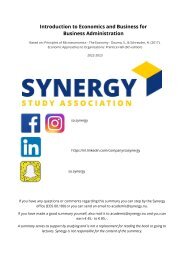Create successful ePaper yourself
Turn your PDF publications into a flip-book with our unique Google optimized e-Paper software.
2. To share proportionately in management (the right to vote for directors)<br />
3. To share proportionately in corporate assets upon liquidation<br />
4. To share proportionately in any new issues of shares of the same class – called the preemptive<br />
right<br />
The pre-emptive right protects an existing shareholder from involuntary dilution of ownership<br />
interest.<br />
The share system easily allows one individual to transfer an interest in a company to another<br />
investor.<br />
3. Development of a variety of ownership interests → In every corporation, one class of shares<br />
must represent the basic ownership interest. That class of shares is called ordinary. Ordinary<br />
shares represent the residual corporate interest that bears the ultimate risks of loss <strong>and</strong> receives<br />
the benefits of success. By special contracts between the corporation <strong>and</strong> its shareholders,<br />
however, the shareholder may sacrifice certain of these rights in return for other special rights or<br />
privileges. Thus special classes of shares, usually called preference shares, are created. In return<br />
for any special preference, the preference shareholder always sacrifices some of the inherent<br />
rights of ordinary shareholders. A common type of preference is to give preference shareholders<br />
a prior claim on earnings.<br />
Equity is the residual interest in the assets of the company after deducting all liabilities. Equity is<br />
often subclassified on the statement of financial position into the following categories: share<br />
capital, share premium, retained earnings, accumulated other comprehensive income, treasury<br />
shares <strong>and</strong> non-controlling interest (minority interest).<br />
Companies often make a distinction between contributed capital <strong>and</strong> earned capital. Contributed<br />
capital is the total amount paid in on capital shares – the amount provided by shareholders to<br />
the corporation for use in the business. Earned capital is the capital that develops from profitable<br />
operations. Retained earnings represents the earned capital of the company. Equity is a residual<br />
interest <strong>and</strong> therefore its value is derived from the amount of the corporations’ assets <strong>and</strong><br />
liabilities.<br />
The Share premium account indicates any excess over par value paid in by shareholders in return<br />
for the shares issued to them. Once paid in, the excess over par becomes a part of the<br />
corporation’s share premium.<br />
Many countries permit the issuance of shares without par value, called no-par shares. The<br />
reasons for issuance of no-par shares are twofold. First, issuance of no-par shares avoids the<br />
contingent liability that might occur if the corporation issues par value shares at a discount.<br />
Second, some confusion exists over the relationship between the par value <strong>and</strong> fair value. If<br />
shares have no par value, the questionable treatment of using par value as a basis for fair value<br />
never arises. A major disadvantage of no-par shares is that some countries levy a high tax on<br />
these issues. Some countries require that no-par hares have a stated value. The stated value is a<br />
minimum value below which a company cannot issue it.<br />
A corporation issues two or more classes of securities for a single payment or lump sum, in the<br />
acquisition of another company. The accounting problem in such lump-sum sales is how to<br />
allocate the proceeds among the several classes of securities. Companies use one of two<br />
methods of allocation: (1) the proportional method <strong>and</strong> (2) the incremental method.<br />
<strong>Accounting</strong> for the issuance of shares for property or services involves an issue of valuation. The<br />
general rule is companies should record shares issues for services or property other than cash at<br />
the fair value of the goods or services received, unless that fair value cannot be measured<br />
reliably. If the fair value of the goods or services cannot be measured reliably, use the fair value<br />
of the shares issued.<br />
34
















